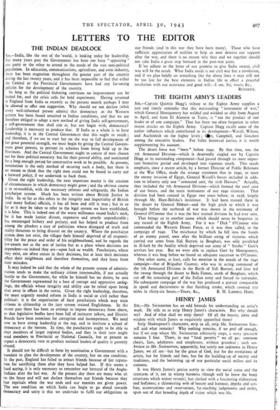THE INDIAN DEADLOCK
LETTERS TO THE EDITOR
S12,—India, like the rest of the 'world, is looking today for leadership. For many years past the Government has been too busy "appeasing " one party or the other to attend to the needs of the vast non-political population. In education, communications, agriculture, and even industry, there has been stagnation throughout the greater part of the country during the last twenty years, and it has been impossible to feel that either the Central or the Provincial Governments have had any far-seeing policies for the development of the country.
So long as the political bickering continues no improvement can be looked for, and the crisis calls for bold experiment. Having returned to England from India as recently as the present month perhaps I may be allowed to offer one suggestion. Why should we not declare (what every well-informed person admits) that democracy an the Western pattern has been found unsuited to Indian conditions, and that we are therefore obliged to adopt a new method of giving India self-government, a self-government that shall aim at, but not begin with, democracy? Leadership is necessary to produce that. If India as a whole is to have leadership, it is in the Central Government that this ought to reside ; and therefore, if we are to start her on the way to full development of her great potential strength, we must begin by giving the Central Govern- ment great powers, to prevent its schemes from being held up in the Provinces. And the Central Government ought to consist of men chosen not for their political notoriety but for their proved ability, and nominated for a long enough period for constructive work to be possible. At present, nomination is the only method of securing such a body, but there is no reason to think that the right men could not be found to carry out a forward policy, if we undertook to back them.
Given the right leadership, the next important matter is the creation of circumstances in which democracy might grow ; and the obvious course is to re-establish, with the necessary reforms and safeguards, the Indian panchaiyat system. Much has been written about British Justice in India. In so far as this refers to the integrity and impartiality of British (and many Indian) officials, it has all been and still is true ; but in so far as it may be taken to refer to the legal system we have established, it is false. This is indeed one of the worst millstones round India's neck, for it has made justice distant, expensive and utterly unpredictable ; has encouraged bribery and perjury; and has helped to produce from among the pleaders a race of politicians whore disregard of truth and reality threatens to bring disaster on the country. Where the panchaiyat system does not exist, the villager feels himself deprived of all responsi- bility for the peace and order of his neighbourhood, and he regards the law-courts not as the seat of justice but as a place where decisions are dependent—as indeed they are—upon luck or wealth. Panchaiyats, where they exist, are often unjust in their decisions, but at least their decisions affect their neighbours and therefore themselves, and they learn from their mistakes.
It may indeed be said that the whole of the present system of adminis- tration tends to make the ordinary citizen irresponsible, if not actually hostile to the Government, for while he himself has no duties, he sees the Government represented by a host of corrupt and oppressive undeg- lings, the officials whose integrity and ability can be relied upon being shut away in offices in the towns. Given the right leadership, therefore, the most urgently needed reform in India is social or civil rather than political: it is the organisation of local panchaiyats which may train citizens in citizenship as the jury system trained Englishmen. In the recent past there has been an attempt to impose democracy from above, so that legislative bodies have been full of insincere talkers, and District Boards have been notorious for corruption and incompetence. We need now to have strong leadership at the top, and to institute a school of democracy at the bottom. In time, the panchaiyats ought to be able to elect members of larger regional bodies, and they in their turn might send members to Provincial or National Councils, but at present to expect a democratic vote to produce national leaders of quality is patently absurd.
It should not be difficult to form by nomination a Government with a mandate to plan the development of the country, but on one condition. In the past, England has failed to attract friends because of her reputa- tion for sacrificing them after they have helped her. If this seems a hard saying, it is only necessary to remember our betrayal of the Anglo- Indians after the last war. At the present day there are many who sit on the fence and will not declare themselves our friends because they fear reprisals when the war ends and our enemies are given power. The one condition on which India can begin to go ahead towards democracy and unity is that we undertake to fulfil our obligations to our friends (and in this war they have been many). Those who have sufficient appreciation of realities to help us now deserve our support after the war, and there is no reason why they and we together should not take India a great step forward in the post-war years.
If we adhere to the letter of our promise to give India swaraj, civil war will be the result. What India needs is not civil war but a revolution, and if we plan boldly on something like the above lines it may still not be too late for the best elements in Indian life to effect a peaceful revolution with our assistance and good will.—I am, Sir, yours, &c.,
RUsTICUS.






















 Previous page
Previous page